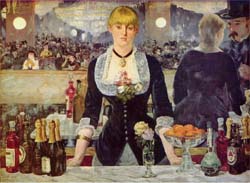|
|
|
|
 |
|
|
|
|
|

|
|
 |
|
le plus-que-parfait |
(ル・プリュスクパルフェ) |
|
|
直接法大過去:「助動詞の未完了(半過去)+過去分詞」
これは、おおよそ英語の過去完了形 (the past perfect tense) に相当する。
|
parler
|
|
aller
|
|
j'avais
tu avais
il/elle avait
nous avions
vous aviez
ils/elles avaient
|
parlé
|
ジャヴェ・パルレ
テュアヴェ・パルレ
イラ/エラヴェ・パルレ
ヌザヴィオン・パルレ
ヴザヴィエ・パルレ
イル/エルザヴェ・パルレ
|
j'étais
tu étais
il/elle était
nous étions
vous étiez
ils/elles étaient
|
allé(e)
allé(e)
allé
allé(e)s
allé(e)(s)
allé(e)s
|
ジェテ・ザレ
テュエテ・ザレ
イレ/エレテ・タレ
ヌゼティオン・ザレ
ヴゼティエ・ザレ
イル/エルゼテ・タレ
|
用法: 過去の動作に先立って完了した動作を表す
|
|
Je connaissais des gens que j'avais rencontrés en vacance à La Baule.
|
| ジュコネセ・デジョン・クジャヴェ・ロンコントレ・オンヴァコンス・アラボ-ル。 |
I knew some people whom I had met on holiday at La Baule.
|
Mes amis m'avaient dit que je pouvais trouver du travail avec eux.
|
| メザミ・マヴェディ・クジュプヴェトルヴェ・デュトラヴァイユ・アヴェクゥ。 |
My friends had told me that I could find work with them.
|
Ils avaient compris depuis longtemps que je voulais m'en aller.
|
| イルザヴェコンプリ・ドピュイロントン・クジュヴレモナレ。 |
| They had long since understood that I wnted to go. |
 ただし、英語で 'for' や 'since' と共に過去完了形で表現している場合、フランス語の方は未完了形: ただし、英語で 'for' や 'since' と共に過去完了形で表現している場合、フランス語の方は未完了形:
| Elle etait a Lyon depuis trois mois. |
| エレテタリヨン・ドピュイトロワモワ。 |
| She had been in Lyon for three months. |
|
|
|
――― ――― ――― ――― ―――
|
|
|
このようなケースでの英語の現在完了形(継続)はフランス語では単に現在形、ドイツ語(G.)もほぼ同じ。
|
Elle vit à Paris depuis deux ans. |
She has been living in Paris for two years. |
|
エルヴィタパリ・ドピュイディゾン。 |
|
|
G.
|
Seit zwei Jahren wohnt sie in Paris. |
|
|
ザイト・ツヴァイヤ-レン・ヴォ-ントズィ-・インパリ。 |
|
|
Ça fait trois ans qu'il est mort.
|
He has been dead for three years.
|
|
サフェトロワゾンキレモ-ル。 |
|
|
G.
|
Er ist seit drei Jahren tot.
|
|
|
エアイスト・ザイトドライヤ-レント-ト。 |
|
|
= Er ist seit drei Jahren gestorben.
|
← これは完了形での表現 |
|
エアイスト・ザイトドライヤ-レン・ゲシュトルベン。
|
|
cf. Leçon 10 の「メモ」の項
|
|
|

|
|
 |
|
le passé simple |
(ルパセ・サンプル) |
|
|
|
|
単純過去:変化の種類は3つ。単純過去形は過去における瞬間的な動作を表す。
物語の叙述に用いられる。話しことばとしては使われない。
人称変化の特徴としては1・2人称複数形のアクサン・シルコンフレックス(â î û)だが、
3人称の単数形と複数形の使用頻度が高い。
-er のタイプの動詞
|
|
donner
|
|
je donnai
tu donnas
il/elle donna
nous donnâmes
vous donnâtes
ils/elles donnèrent
|
ジュ・ドンネ
テュ・ドンナ
イル/エル・ドンナ
ヌ・ドンナ-ム
ヴ・ドンナ-トゥ
イル/エル・ドンネ-ル
|
-re, -ir のタイプの動詞
|
-oirのタイプの動詞の大部分とetre, avoir
|
|
finir
|
|
vouloir
|
|
je finis
tu finis
il/elle finit
nous finîmes
vous finîtes
ils/elles finirent
|
ジュ・フィニ
テュ・フィニ
イル/エル・フィニ
ヌ・フィニ-ム
ヴ・フィニ-トゥ
イル/エル・フィニ-ル
|
je voulus
tu voulus
il/elle voulut
nous voulûmes
vous voulûtes
ils/elles voulurent
|
ジュ・ヴリュ
テュ・ヴリュ
イル/エル・ヴリュ
ヌ・ヴリュ-ム
ヴ・ヴリュ-トゥ
イル/エル・ヴリュ-ル
|
|
|
Qu'est que tu as ? demanda Alain.
|
ケスクテュア? ドモンダ・アラン。
|
What's the matter? asked Alain.
|
Oui, répondit Pierre ! On est parti sans lui.
|
ウィ、レポンディ・ピエ-ル。オンネパルティ・ソンルイ。
|
Yes, answered Pierre. We've left without him.
|
なお、小説などの中での描写であっても、単純過去が用いられるのはあくまで過去の1時的な動作の場合:
Les Parisiens furent excédés; la foule se rassembla palace Royale
et se dirigea vers la fortresse de la Bastille.
|
レパリジアン・フュ-ル・テクセデ;ラフル・スラソンブラ・パラスロワィヤル・
エスディリジャ・ヴェ-ルラフォルトレス・ドラバスティ-ユ。 |
The Prisians lost all patience; the crowd gathered in the Place Royale
and went towards the fortress of the Bastille.
|
cf. 継続的な動作の場合は、未完了:
Il faisait noir. Legrand attendait impatiemment l'arrivée de l'inspecteur.
Soudain, il entendit de bruits - une voiture s'arrêta.
|
イルフゼノワ-ル。ルグロンアトンデ・タンパシアモン・ラリヴェドランスペクトェ-ル。
スダン、イロントンディ・ドブリュイ - ュヌヴォワテュ-ルサレタ。 |
辺りは真っ暗だった。ルグロンは刑事の到着を待ちわびていた。
とつぜん、物音が聞こえた。― 車が止まった。 |
| La pluie brouillait les carreaux; dehors nous ne vîmes rien. |
| ラプリュィ・ブルイェレカロ;ドオ-ル・ヌヌヴィ-ムリヤン。 |
| The rain was blurring the window panes; outside we could see nothing. |
|
|

|
|
 |
|
le passé antérieur |
(ルパセ・オンテリェ-ル) |
|
直接法前過去:「助動詞の単純過去形+過去分詞」
|
aimer |
|
j'eus
tu eus
il/elle eut
nous eûmes
vous eûtes
ils/elles eurent
|
aimé |
ジュ・ゼメ
テュユ・ゼメ
イリュ/エリュ・テメ
ヌズュ-ム・ゼメ
ヴズュ-ト・ゼメ
イル/エル・ズュ-ル・テメ
|
|
arriver |
|
je fus
tu fus
il/elle fut
nous fûmes
vous fûtes
ils/elles furent
|
arrivé(e)
arrivé(e)
arrivé
arrivé(e)s
arrivé(e)(s)
arrivés
|
ジュフュ・ザリヴェ
テュフュ・ザリヴェ
イル/エルフュ・タリヴェ
ヌフュ-ム・ザリヴェ
ヴフュ-トゥ・ザリヴェ
イル/エル・フュ-ル・タリヴェ
|
|
単純過去形で示された動作のその直前に完了した動作を表す。
ふつうは quand, lorsque, dès que . . . (when, as soon as) などの従属文の中で用いられる。
単純過去と同じく日常会話には用いない。
Quand ils furent repartis,
Laurent adressa cette lettre au directeur de l'établissement:
|
コンティルフュ-ルルパルティ、
ロロジアドレサセトレトル・オディレクトェ-ル・ドレタブリスモン: |
When they had left, Laurent sent this letter to the manager of the establishment:
|
Quand il fut rentré, sa femme lui demanda comment il avait passé son temps.
|
コンティルフュロントレ、サファムリュイドモンダ・コモンティラヴェパセ・ソントン。
|
| When he had returned, his wife asked him how he had spent his time. |
| Quand ils eurent choisi la date, ils retinrent une salle pour la fête. |
| コンティルズユ-ルショワズィラダト、イルルタ-ンルテュヌサル・プルラフェト。 |
| When they had chosen the date, they reserved a hall for the party. |
|

Édouard Manet
Un bar aux Folies Bergère
1881 - 1882
Institut Courtauld, Londres
|
|
|
 なお、ついでに言えば、この前過去の口語的形態は なお、ついでに言えば、この前過去の口語的形態は
重複合過去 ( le passé surcomposé )(ルパセ・スィルコンポゼ)「助動詞の複合過去+過去分詞」
そのサンプルを少し:
Quand ils a eu fini de parler, il a regagné sa place.
|
コンティラウフィニドパルレ、イラルガニェサプラス。
|
When he had finished speaking, he returned to his place.
|
Dès qu'ils ont eu raconté leur histoire, tout le monde a applaudi.
|
デキルゾントゥラコンテレリストワ-ル、トウルモンダアップラウディ。
|
When they had told their story, everyone applauded.
|
|
|

|
|
    |
|
|
Et si l'on parle mal le français - ce qui n'est pas votre cas - , on dit qu'on parle comme une <<vache espagnole>>.
エスィロンパルルマ-ル ルフロンセ ― スキネパヴォトルカ ―、オンディコンパルル・コム ュヌ『ヴァシュ エスパニョル』
|
|
|
| mal (badly), un cas (a case), une vache (a cow), espagnol (Spanish). |
|
|
|
|
|
|
|
|
|
|
 |
|
|
|
|
|
|